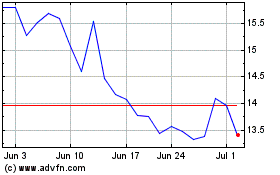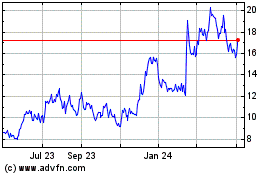By Corrie Driebusch and Maureen Farrell
This article is being republished as part of our daily
reproduction of WSJ.com articles that also appeared in the U.S.
print edition of The Wall Street Journal (May 9, 2019).
Uber Technologies Inc. is on track to price its initial public
offering at the midpoint of its target or below, according to
people familiar with the matter, following a big stock-market drop
and the disappointing debut of rival Lyft Inc.
Uber is currently pitching investors across the country on its
shares, which are set to price Thursday ahead of a Friday trading
debut. The ride-hailing giant has set a range of $44 to $50 share,
or about $80 billion to $90 billion, already down from its earlier
indication.
Investors are still putting in their orders for the shares and
things could shift before the price is set later Thursday. There is
currently enthusiasm for shares in the bottom half of the range,
one person familiar with the matter said.
If the stock is priced at the $47-a-share midpoint, Uber's
valuation on a fully diluted basis would be roughly $86 billion.
That would still enable current investors like SoftBank Group Corp.
to reap major windfalls, but not quite as big as ones they had been
eyeing.
In the weeks before it officially set a price range, Uber had
provided documentation to holders of its convertible notes setting
a potential band of $48 to $55 a share, or $90 billion to $100
billion, including what it expects to raise in the offering -- now
about $8 billion to $10 billion. Last year, lead underwriters
Morgan Stanley and Goldman Sachs Group Inc. had pitched the company
on a valuation of as much as $120 billion.
Uber's offering appears to be falling victim at least in part to
unfortunate timing. On Tuesday, the Dow Jones Industrial Average
suffered its biggest decline in months on escalating trade-dispute
fears, a selloff that hit tech stocks hardest. The Dow industrials
are down roughly 2% this week, and investors and traders say they
expect more choppiness ahead.
The ride-hailing giant's listing has been overshadowed in recent
weeks by Lyft's woes. Its smaller rival's shares dropped 11% on
Wednesday, closing at their lowest level ever after the company
reported first-quarter results late Tuesday.
Lyft shares have now fallen by nearly 27% from their IPO price,
which exceeded the range the company was targeting during its
roadshow, something that may also be weighing on the minds of the
decision makers at Uber.
Another factor that could be prompting caution among potential
Uber investors: Drivers protested around the country Wednesday
against Uber and Lyft, saying they've failed to pay them a living
wage.
Diminishing expectations for Uber's IPO, the biggest in years,
could put somewhat of a damper on what is expected to be one of the
best years ever for new issues as many big technology startups rush
to the public markets. Still, others that have made their debuts in
recent weeks have performed well. Pinterest Inc.'s shares are up
more than 50% from their offer price, and Zoom Video Communications
Inc.'s stock is trading at more than double its initial level.
Alternative-meat startup Beyond Meat Inc. has more than
tripled.
SoftBank is set to be one of the biggest beneficiaries of
investors' general enthusiasm for IPOs.
Its Vision Fund, the world's largest technology investor, is in
line to reap a paper profit of roughly $3 billion on Uber's debut.
When SoftBank bought into the company in early 2018, writing a $7.7
billion check for a roughly 15% stake, Uber had been reeling from a
series of crises and was valued at around $48 billion.
The gain represents one of the biggest triumphs so far for the
$100 billion Vision Fund, which was launched in spring 2017. It
could aid its aggressive growth plans, including a possible IPO of
its current fund and potentially raising another one of the same
size or larger.
There have been other wins too. SoftBank's roughly $300 million
investment in Guardant Health Inc., which went public in October
2018, is now valued at more than six times that. The fund is also
an investor in Slack Technologies Inc. and WeWork Cos., both of
which are preparing for big 2019 debuts.
Vision Fund executives say that by later this year, they expect
at least one company from the portfolio will make a debut each
month on average.
The circumstances of SoftBank's investment in Uber are unique,
however. Early in 2017, Travis Kalanick, Uber's co-founder and
chief executive at the time, was under fire from unhappy customers
and competitors, as well as from employees who were voicing
concerns over a culture that allegedly permitted sexual harassment
and sexism.
In the spring of that year, Peter Fenton, a general partner at
early Uber investor Benchmark, flew to London to meet Rajeev Misra,
CEO of the Vision Fund, at SoftBank's office in the posh Mayfair
district. As part of that conversation and in follow-up meetings,
they discussed whether SoftBank would consider a fresh investment
in Uber or buying existing stakes, people familiar with the meeting
said. But the two sides were far apart on price and the talks
eventually flamed out.
By late June 2017, Mr. Kalanick resigned under pressure from a
group of investors including Benchmark. Shortly thereafter,
SoftBank started talking to Uber's board and other investors about
an investment, people familiar with the conversations said.
During more than a dozen meetings that followed, Benchmark and
other key investors who had the right to block any share sales
sought two crucial promises from the Vision Fund should it become a
big shareholder with important sway: It wouldn't support a return
of Mr. Kalanick as CEO, and it would back the elimination of excess
voting rights for Uber's founders and certain existing
shareholders.
SoftBank agreed to both terms. Mr. Misra met with the three key
CEO candidates and supported the board's decision to choose Dara
Khosrowshahi, according to people familiar with the meetings. By
October 2017, Uber's board had approved a deal with SoftBank that
closed in January 2018.
Write to Corrie Driebusch at corrie.driebusch@wsj.com and
Maureen Farrell at maureen.farrell@wsj.com
(END) Dow Jones Newswires
May 09, 2019 02:47 ET (06:47 GMT)
Copyright (c) 2019 Dow Jones & Company, Inc.
Lyft (NASDAQ:LYFT)
Historical Stock Chart
From Mar 2024 to Apr 2024

Lyft (NASDAQ:LYFT)
Historical Stock Chart
From Apr 2023 to Apr 2024
